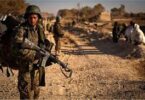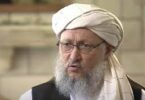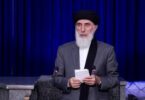Monitoring Desk
KABUL: The commander of the Military of European Union and permanent representatives of come NATO member countries paid visit to Kabul on Saturday. “General Curtis Scaparrotti, Supreme Allied Commander Europe, as well as ambassadors from Resolute Support framework nations, visited RS service members and met with senior leaders February 23-24 to discuss the mission and reiterate NATO’s commitment to lasting security in Afghanistan,” a press release issued by the media office of Resolute Support stated.
“The Permanent Representatives to NATO from Germany (Ambassador Hans-Dieter Lucas), Italy (Ambassador Claudio Bisogniero), Turkey (Ambassador Mehmet Fatih Ceylan), and the United States (Ambassador Kay Bailey Hutchison) and Gen. Scaparrotti met with General John Nicholson, Resolute Support commander, NATO’s Senior Civilian Representative, Ambassador Cornelius Zimmermann, as well as officials from the National Unity Government of Afghanistan and Afghan military and police leaders. The visitors learned of progress in training, advising, and assisting the Afghan National Defense and Security Forces and the Afghan government’s commitment to securing Afghanistan and building a future for all Afghans,” the press release said. “We are not going to stand by and let Afghanistan be riven with violence again,” said Ambassador Hutchison. “So we hope that the Taliban will see that this is a no-win game for them unless they come to the table and become part of something that would make Afghanistan stronger.
“We have 29 allies who are speaking with one voice that peace in Afghanistan is a goal that will protect Afghans and it will protect Europe. It will protect America and Canada. Our North Atlantic Alliance is firm on this subject,” Hutchison added. “Germany, Italy, Turkey, and the United States are RS framework nations, meaning they command the different regions in Afghanistan. They also represent some of the largest troop contributors to Resolute Support and the former International Security Assistance Force. Afghan Security Forces took over the lead for combat operations from ISAF in January, 2015, and RS became exclusively a TAA mission,” the press release added.
“In 2017, Afghan Security Forces denied the Taliban any of their stated battlefield objectives—preventing them from capturing a single provincial capital—and have continued to pressure insurgents across the country throughout the winter,” the press release maintained. “What we are seeing is a lowering of ambition of the Taliban,” said Gen. Nicholson. “Following the announcement of the U.S. South Asia Policy, the enemy made another decision to lower their ambition again and resort to terrorist attacks and to avoid the kind of fights where they have lost so heavily. So this exposes the hypocrisy of the Taliban, who every year talk about the desire to decrease civilian casualties and now are directly targeting civilians and taking credit for it.”
“Gen. Scaparrotti and the ambassadors also visited Train, Advise, Assist Commands North, West, and Capital. German-led TAAC-N in Mazar-e-Sharif includes 21 allied and partner nations and works closely with Afghan partners from the 209th Afghan National Army Corps, and the 707th and 808th Afghan National Police Zone. Italian-led TAAC-W in Herat advises Afghan partners from the ANA 207th Corps and 606th ANP Zone. Turkish-led TAAC-C advises Afghan forces securing Kabul, including the 111th Capital Division and Kabul City Police Center,” it added. “Afghan Security Forces continue to improve their expertise and capabilities day-by-day,” said Gen. Scaparrotti. “NATO remains committed to supporting them as they develop their capabilities, strengthen command and control, and prepare the next generation of military leaders.”
“At the NATO Summit in Warsaw, 2016, NATO Allies and Resolute Support operational partners committed to sustain the NATO-led Resolute Support, to continue national contributions to the financial sustainment of the Afghan security forces, and to strengthen the Enduring Partnership between NATO and Afghanistan through political dialogue and practical cooperation,” the press release stated. “At their meeting in November 2017, Defence Ministers from NATO Allies and Resolute Support operational partners committed to increase the strength of the Resolute Support Mission from around 13,000 to around 16,000 troops; they also confirmed they will continue to fund the Afghan Security Forces until at least 2020,” it said.
“In July, 2018, a NATO Summit will be held in Brussels where heads of state and government from NATO Allies are expected to reaffirm NATO’s continued commitment to Afghanistan,” the press release added. “NATO’s support to the Afghan Security Forces and institutions is key to supporting the implementation of Afghan President Ashraf Ghani’s roadmap to further develop the Afghan security forces and institutions. The roadmap, unveiled by the Afghan National Unity Government in early 2017, outlines a plan for securing and maintaining control of 80% of the population, as well as committing to continuing reforms on good governance within the Afghan security apparatus,” it said.
“We are in a win-win situation if we, all together, concentrate on protecting stability to this country,” said Ambassador Zimmermann. “A stable Afghanistan will be to the benefit of each and every player in this region — this needs to be understood — that ultimately a peaceful and stable Afghanistan will be to the betterment of us all.”
Meanwhile, Ambassadors from NATO’s Resolute Support nations have reiterated NATO’s commitment to lasting security in Afghanistan. NATO Supreme Allied Commander Europe General Curtis Scaparrott and ambassadors from the Resolute Support framework nations, visited RS troops and met with senior leaders from February 23-24 to discuss the mission, said a press release issued by RS headquarters here on Saturday.
The Permanent Representatives to NATO from Germany Hans-Dieter Lucas, Italy Claudio Bisogniero), Turkey Mehmet Fatih Ceylan, and the United States ambassador Kay Bailey Hutchison and Gen. Scaparrotti met with General John Nicholson, Resolute Support commander, NATO’s Senior Civilian Representative, Ambassador Cornelius Zimmermann, as well as officials from the National Unity Government of Afghanistan and Afghan military and police leaders.
The press release said the visitors learned of progress in training, advising, and assisting the Afghan National Defense and Security Forces and the Afghan government’s commitment to securing Afghanistan and building a future for all Afghans. “We are not going to stand by and let Afghanistan be riven with violence again,” said Ambassador Hutchison. “So we hope that the Taliban will see that this is a no-win game for them unless they come to the table and become part of something that would make Afghanistan stronger. “We have 29 allies who are speaking with one voice that peace in Afghanistan is a goal that will protect Afghans and it will protect Europe. It will protect America and Canada. Our North Atlantic Alliance is firm on this subject,” Hutchison added.
Germany, Italy, Turkey, and the United States are RS framework nations, meaning they command the different regions in Afghanistan. In 2017, Afghan Security Forces denied the Taliban any of their stated battlefield objectives—preventing them from capturing a single provincial capital—and have continued to pressure insurgents across the country throughout the winter, the statement said.
“What we are seeing is a lowering of ambition of the Taliban,” said Gen. Nicholson. “Following the announcement of the U.S. South Asia Policy, the enemy made another decision to lower their ambition again and resort to terrorist attacks and to avoid the kind of fights where they have lost so heavily. So this exposes the hypocrisy of the Taliban, who every year talk about the desire to decrease civilian casualties and now are directly targeting civilians and taking credit for it.” He said NATO remained committed to supporting Afghan security forces as they developed their capabilities, strengthened command and control, and prepare the next generation of military leaders. In July, 2018, a NATO Summit will be held in Brussels where heads of state and government from NATO Allies are expected to reaffirm NATO’s continued commitment to Afghanistan.
The statement said NATO’s support to the Afghan Security Forces and institutions is key to supporting the implementation of Afghan President Ashraf Ghani’s roadmap to further develop the Afghan security forces and institutions. The roadmap, unveiled by the Afghan National Unity Government in early 2017, outlines a plan for securing and maintaining control of 80% of the population, as well as committing to continuing reforms on good governance within the Afghan security apparatus.






